Book Review: Blue was the Colour: A Tale of Tarnished Love (Football Shorts) by Andy Hamilton
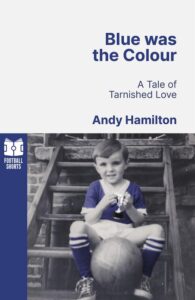 Football Shorts are a series of books created in a collaboration between award-winning journalist and author Ian Ridley’s own publishing company Floodlit Dreams and renowned sports book publisher, Pitch Publishing. Ridley details in the Notes and Acknowledgments of the first in the series, Pantomime Hero: Memories of the Man Who Lifted Leeds United After Brian Clough, that the inspiration came about during lockdown and his desire for a short sporting read.
Football Shorts are a series of books created in a collaboration between award-winning journalist and author Ian Ridley’s own publishing company Floodlit Dreams and renowned sports book publisher, Pitch Publishing. Ridley details in the Notes and Acknowledgments of the first in the series, Pantomime Hero: Memories of the Man Who Lifted Leeds United After Brian Clough, that the inspiration came about during lockdown and his desire for a short sporting read.
The intention was that there would be three books in 2023, and this outstanding hat-trick of the written word has been achieved, with the first, Pantomime Hero: Memories of the Man Who Lifted Leeds United After Brian Clough by Ridley, released in January 2023, the second The Homecoming: The Lionesses and Beyond, from Jane Purdon in May 2023 and finally from comedian and writer Andy Hamilton with Blue was the Colour: A Tale of Tarnished Love out in September 2023.
***************
What links all three of these wonderful books is that they are personal stories written with genuine passion for the ‘beautiful game’ and its past, present and future. All three writers are respected figures in their particular fields, but at the heart of their writing is the overwhelming ability to let readers know that they are football fans.
In the case of Andy Hamilton’s, Blue was the Colour, the book looks at his changing relationship with Chelsea and indeed the game from his childhood to adult life, with the subtitle, A Tale of Tarnished Love, more than a clue as to how this has changed down the years.
For those wondering about the title of the book, Blue was the Colour, it is a play on words taken from the title of the single that the Chelsea players released in 1972 called, Blue Is the Colour (although on my occasional visits to the Bridge I was more of a fan of Liquidator by The Harry J Allstars). And like the book sub-title, reinforces the idea of Hamilton’s reassessment of his feelings and connection to the Stamford Bridge club.
As you’d expect from a man of his writing talent, Hamilton’s reflections here are witty, thought provoking, yet balanced – filled with joy and at times sadness, as well as disappointment and regret – a bit like watching your team really.
He uses the device of two Chelsea v Newcastle United fixtures (62 years apart) to bookend his journey supporting the club as he grows from boyhood to manhood, with observations about changes in the game thrown in for good measure. And these two fixtures tell you much about how Hamilton’s feelings have changed, when he details:
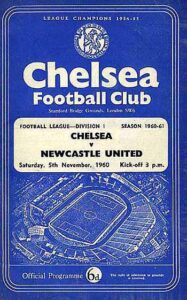 The (first) match back in 1960 was the first game I ever saw. I was six and a half years old and I watched from the terraces in a state of all-consuming, heart-thumping, knee-jiggling, bladder-squeezing excitement and wonder.
The (first) match back in 1960 was the first game I ever saw. I was six and a half years old and I watched from the terraces in a state of all-consuming, heart-thumping, knee-jiggling, bladder-squeezing excitement and wonder.
I did not watch the second match. I only listened to the closing moments of the game on Radio 5 Live as I pottered around the kitchen trying to find some scissors.
This book is my attempt to map the distance between those two states of mind – from a world where Chelsea v Newcastle was, at that moment, the only thing that mattered ‘in the entire universe’ to one where it was less important than scissors.
Of course as Hamilton acknowledges, that has as much to do with him growing up as it has to do with the game as it is today.
The sport that he fell in love with still had players on the maximum wage of £20, with some still travelling to games on public transport and were still accessible and relatable to the working class fans who filled the grounds. Kick-offs were on a Saturday at 3pm and the FA Cup held pride of place of the football calendar. However, before you think this is maybe some sentimental less than subjective view of the game Hamilton first watched, he admits that the violence on the terraces, racism within the game and the poor conditions within stadiums were also a reality of football in his formative years.
So what has lessened his love for the game today? Well, as someone a little younger than Hamilton it is for reasons I completely understand. It feels like he is speaking for a generation of supporters who have no love for what the Premier League stands for and what the billionaire owners and Sky have done to the game. Also, getting a bashing – deservedly – are FIFA and VAR amongst other things.
Despite this, Hamilton hopes that in another 60 years there will be six year olds as giddy as he was back in 1960 excited at going to their first game in stadiums will be full and still played on a Saturday.
Now that’s a thought that shouldn’t leave us blue.
(Publisher: Football Shorts. September 2023. Paperback:? 184 pages)
Buy the book here: Blue was the Colour
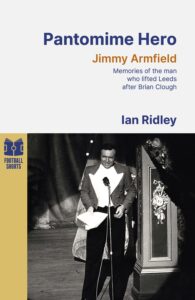 Football Shorts are a series of books created in a collaboration between award-winning journalist and author Ian Ridley’s own publishing company Floodlit Dreams and renowned sports book publisher, Pitch Publishing. Ridley details in the Notes and Acknowledgments of the first in the series, Pantomime Hero: Memories of the Man Who Lifted Leeds United After Brian Clough, that the inspiration came about during lockdown and his desire for a short sporting read.
Football Shorts are a series of books created in a collaboration between award-winning journalist and author Ian Ridley’s own publishing company Floodlit Dreams and renowned sports book publisher, Pitch Publishing. Ridley details in the Notes and Acknowledgments of the first in the series, Pantomime Hero: Memories of the Man Who Lifted Leeds United After Brian Clough, that the inspiration came about during lockdown and his desire for a short sporting read. The Homecoming as with Ian Ridley’s Pantomime Hero is a heartfelt and personal story and not a single word is wasted in the 160 pages.
The Homecoming as with Ian Ridley’s Pantomime Hero is a heartfelt and personal story and not a single word is wasted in the 160 pages.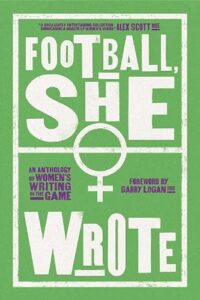 FBR has some talented contributors, none more so that Jade Craddock who has been a regular writer for FBR with her insightful book reviews and articles covering the delayed 2020 Euros and the start of the 2021/22 Premier League and Women’s Super League. Jade’s talents have been recognised with a chapter in Football She Wrote. As part of the launch of the book, FBR caught up with Jade to find out a bit more about her football and writing background. This second part of the interview looks at Jade’s connection with the game as fan and a player.
FBR has some talented contributors, none more so that Jade Craddock who has been a regular writer for FBR with her insightful book reviews and articles covering the delayed 2020 Euros and the start of the 2021/22 Premier League and Women’s Super League. Jade’s talents have been recognised with a chapter in Football She Wrote. As part of the launch of the book, FBR caught up with Jade to find out a bit more about her football and writing background. This second part of the interview looks at Jade’s connection with the game as fan and a player.
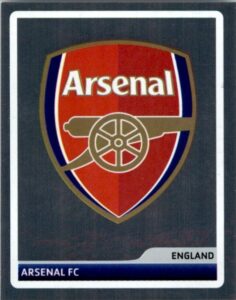 JC: I grew up and live in the Midlands – my nearest league clubs being Birmingham City and Aston Villa, so obviously I’m an Arsenal fan! I did almost take a couple of different paths though. Villa was very much the club of choice in my school in the nineties – and that green and black Muller kit almost sold them to me, as well as the likes of Tony Daley and Dalian Atkinson, who were probably the first footballers I was really aware of. I also did work experience at Villa when I was 15 and there couldn’t be a nicer footballer than Cesc Fabregas. Alas, even Dion couldn’t sway me to the claret and blue in the end. In the late nineties when I moved to middle school, Liverpool were suddenly all the rage – it probably had something to do with those white suits?! And for a time, Liverpool were somewhat on my radar, not least because of Michael Owen’s heroics at World Cup 1998. But again, it wasn’t to be. When I started playing football myself in earnest and suddenly became much more aware of the game, began watching it religiously and understanding it as more than just a casual observer, there was really only one team at the time that played football the way I dreamt and imagined it should be played at its best – Arsenal. This was the age of Pires and Ljungberg and as a young winger myself, here were two proper attacking wingers. Add to that, the general ethos and style of play under Wenger in that period and the players in that squad and I was hooked. But one man ensured my heart was red – Cesc Fabregas. To me, he was everything that epitomised that Arsenal – stylish, intelligent, committed. He was, and remains, my favourite player. I’d always hoped he’d come back to the Emirates and thought we could have done more to bring him back when he left Barcelona, but even though he ended up at Chelsea, I always felt his heart was at Arsenal and if you took off that blue jersey there’d be a red one underneath – well, that’s what I told myself anyway!
JC: I grew up and live in the Midlands – my nearest league clubs being Birmingham City and Aston Villa, so obviously I’m an Arsenal fan! I did almost take a couple of different paths though. Villa was very much the club of choice in my school in the nineties – and that green and black Muller kit almost sold them to me, as well as the likes of Tony Daley and Dalian Atkinson, who were probably the first footballers I was really aware of. I also did work experience at Villa when I was 15 and there couldn’t be a nicer footballer than Cesc Fabregas. Alas, even Dion couldn’t sway me to the claret and blue in the end. In the late nineties when I moved to middle school, Liverpool were suddenly all the rage – it probably had something to do with those white suits?! And for a time, Liverpool were somewhat on my radar, not least because of Michael Owen’s heroics at World Cup 1998. But again, it wasn’t to be. When I started playing football myself in earnest and suddenly became much more aware of the game, began watching it religiously and understanding it as more than just a casual observer, there was really only one team at the time that played football the way I dreamt and imagined it should be played at its best – Arsenal. This was the age of Pires and Ljungberg and as a young winger myself, here were two proper attacking wingers. Add to that, the general ethos and style of play under Wenger in that period and the players in that squad and I was hooked. But one man ensured my heart was red – Cesc Fabregas. To me, he was everything that epitomised that Arsenal – stylish, intelligent, committed. He was, and remains, my favourite player. I’d always hoped he’d come back to the Emirates and thought we could have done more to bring him back when he left Barcelona, but even though he ended up at Chelsea, I always felt his heart was at Arsenal and if you took off that blue jersey there’d be a red one underneath – well, that’s what I told myself anyway!